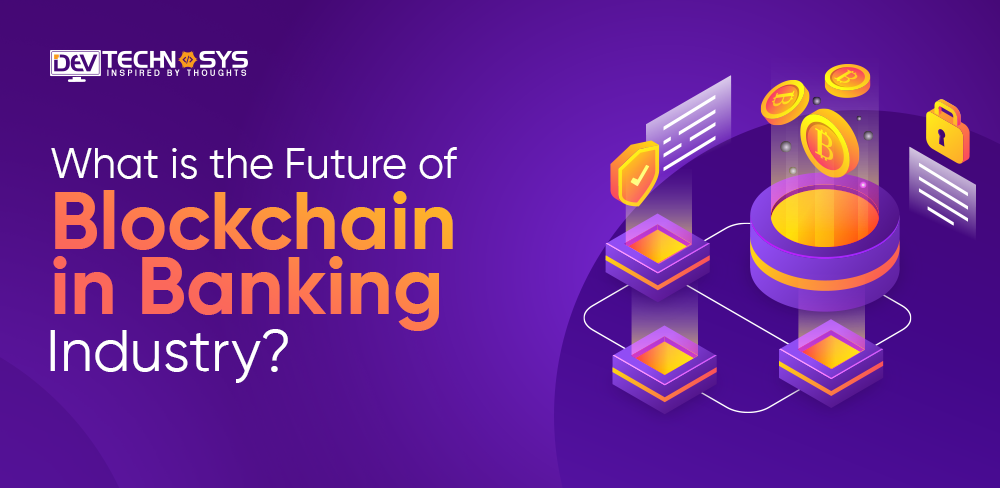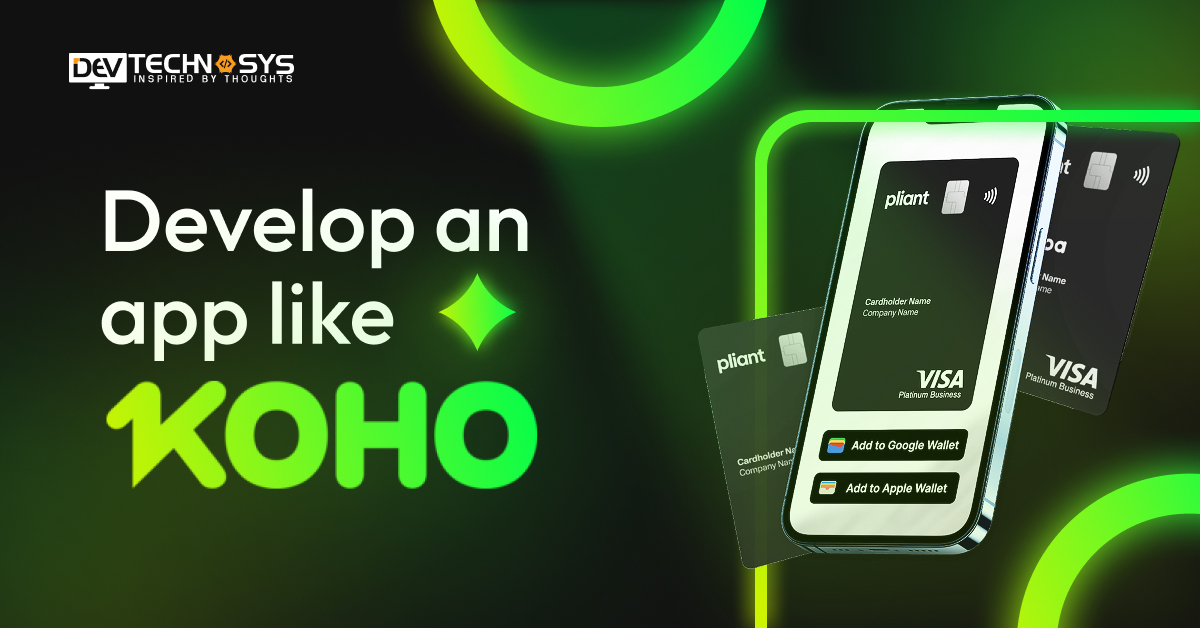“Blockchain is not just a technological innovation, it is the future of the digital world.”
Arif Naseem
Blockchain technology has the ability to fundamentally alter the financial industry. This is not a mere buzzword; it’s an important force that is reshaping banking. What is the future of blockchain in banking industry?
We’re faced with questions and possible solutions as we look into the crystal-ball of financial technology. These will redefine how banks operate, the way transactions are conducted, and the way customers interact with financial institutions.
Blockchain offers a glimpse of a world where financial services will be more accessible, with increased trust and security.
This guide will take you on a journey to the potential of Blockchain in banking industry. We’ll look at its advantages, difficulties, and applications. Buckle up as we explore the fascinating world of blockchain and its impending influence on the banking sector.
So, let’s begin.
What is Blockchain in Banking?
Blockchain in finance and banking industry is a technology of decentralized ledgers that records and verifies all transactions in a secure manner. It increases trust and transparency through the creation of a chain of data blocks that is resistant to tampering, which prevents fraud and mistakes.
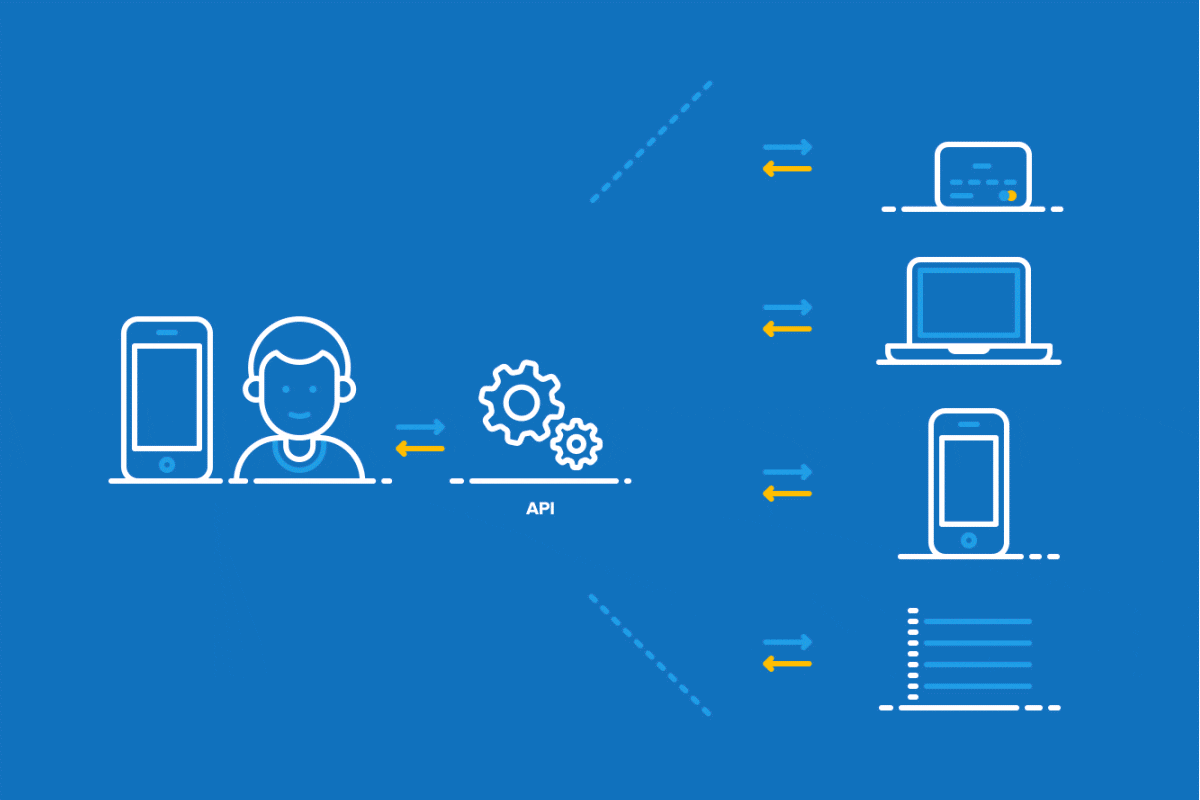
It streamlines banking processes such as payments, identity checks, and loan approvals. This reduces costs and settlement time. Blockchain in finance industry also enables smart contracts that automate agreements when certain conditions are met.
Blockchain app development offers significant security benefits and is a great way to improve efficiency, but its adoption by the banking industry has not yet reached its full potential. Regulators are still addressing privacy concerns, interoperability, scalability, and the expertise of a Blockchain app development services provider is crucial in navigating these challenges.
Market Stats of Blockchain in Financial Sector
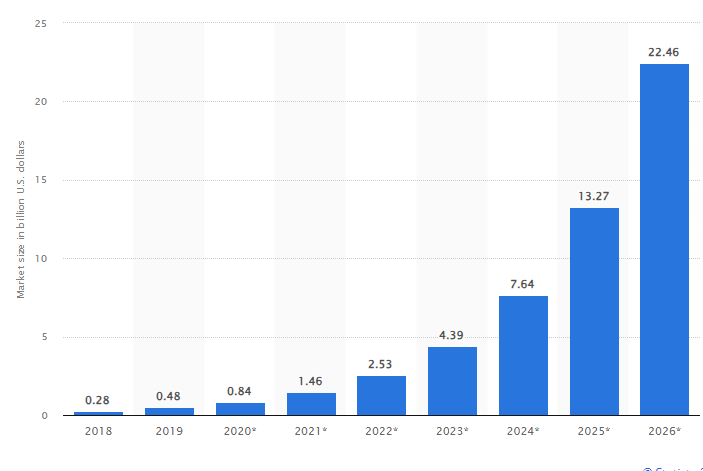
- In the coming years, the banking app like Chime, Ally etc of blockchain technology to the financial sector will continue to grow. The market is estimated at approximately 22,5 billion U.S. Dollars in 2026.
- Global blockchain market in banking and financial services reached nearly $2,034.1 in 2021. This is a growth of 62.7% annually since 2016. Market growth is projected to be 53.9%, from $2,034.1 in 2021, to $17.583.4 in 2026.
- In the U.S., 158 practical examples of blockchain in the financial domain and banking service were recorded in 2019.
- Banks were involved in 411 projects involving the implementation of blockchain technology in financial services.
- In 2018, the global blockchain market was worth 1.57 billion U.S. Dollars. By 2027, it is expected to increase by more than 100 times.
Benefits of Blockchain in Banking Industry
As per the mobile banking app development company, below are the benefits of blockchain technology in banking industry. So let’s have a look:
1. Security
The blockchain in finance and banking provides a high degree of security. The encryption of the network and the fact that information can be edited are both factors. The high level of security that the enterprise blockchain offers to banks is a great benefit.
It is both about the client information that can be stored on a Blockchain and the internal processes which can be made easier. The banks using blockchain technology a network of this kind, they can be assured that sensitive data is protected.
2. Traceability
Blockchain transactions are anonymous. This means that if John Smith sent Jane Doe money, the names of both the sender and the recipient will not be recorded on the blockchain. Transactions can still be traced, despite this.
The integration of blockchain with banking industry can offer significant advantages. Transactions on this network are transparent, with only wallet addresses visible. Therefore, in Fintech app development, using enterprise blockchain ensures precise tracking of all actions, down to the exact moment and address, enhancing security and accountability.
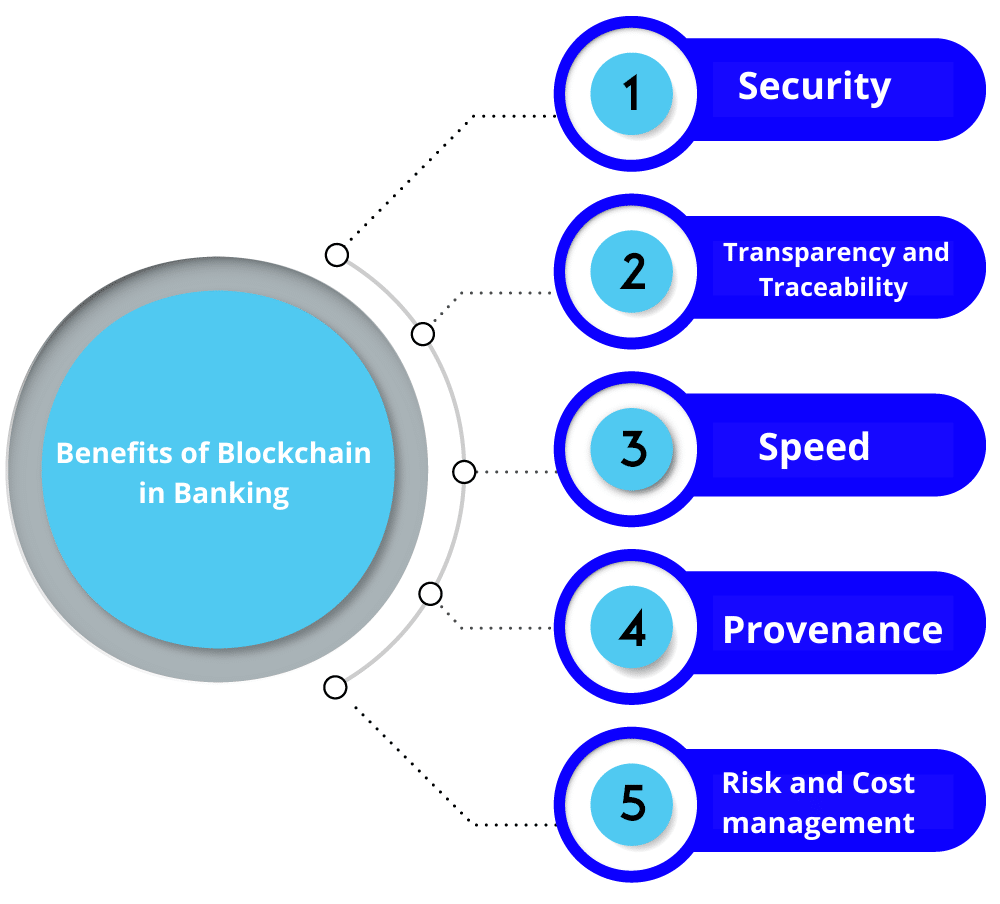
3. Cost Management
The blockchain in banking industry can help reduce costs, both for institutions and customers. Many traditional bank operations cost a set amount, which can discourage clients. It is a grave threat to traditional banks, as cryptocurrency allows for the same operation at lower costs.
Banks can cut costs for users and reduce their internal expenditures by using an enterprise blockchain. This will make both in-office and online services more accessible. So, it will be beneficial for businesses to develop a banking website and web app for better cost management.
4. Transaction Speed
We already knew that the speed of conventional transactions can be slow. The reason for this is that there are many operations. Some of them are not even performed by the bank, but rather by a third-party middleman.
Enterprise blockchain transactions are often much faster than traditional ones. In a traditional bank you might have to wait for several days before your money is transferred. This can be even longer if the transfer is overseas.
Some public blockchains allow you to send and receive payments in minutes, not hours. If banks can offer this to their customers, engagement will certainly increase by multiples.
5. International Transaction Facilitation
Blockchain in finance industry may also help overcome geographical barriers. Many clients and businesses suffer long processing times when sending or receiving payments from accounts in other countries.
Blockchain does not care where money is sent from or where it comes from. The network operates entirely on the Internet, so it does not need physical borders. The clients will benefit from cheaper transactions, and the banks can improve services by speeding things up.
Challenges of Using Blockchain in Banking Industry
Blockchain in credit banking industry can provide many benefits, including increased security, transparency and efficiency. There are a few significant challenges banks will face when adopting Blockchain:
1. Regulatory Compliance
The regulatory environment is complex, and navigating it can be a challenge. Financial regulators have yet to adapt to this innovative technology. This may lead to uncertainty and possible legal issues.
While using blockchain to manage customer data and conduct transactions, banks must comply with anti-money laundering, Know Your Customer, and data privacy regulations. Blockchain adoption requires regulatory approval and industry standards.
2. Scalability
Due to their limited processing speed, blockchain networks such as Bitcoin and Ethereum have scalability problems. Existing blockchain solutions might not be able to meet the needs of current banking industry, which processes thousands of transactions per second. The challenge of a blockchain development platform that can handle high transaction volumes while maintaining security is a major one.
3. Interoperability
Banking relies on an ecosystem of networks, systems, and institutions. Interoperability is a challenge between legacy systems and the emerging blockchain networks. Blockchain’s potential can only be realized through seamless integration. This allows banks to exchange assets and data efficiently, while still maintaining compatibility with existing infrastructure.
4. Security Concerns
Blockchain in financing industry, while renowned for the security it offers, is not immune from threats. Hackings and vulnerabilities within smart contracts could cause significant financial loss and damage to a bank’s reputation.
To ensure the robustness of blockchain systems, ongoing security audits and bug fixes are required, as well as constant vigilance. So, when you create a smart contract on blockchain, you should make sure its security is up to mark.
5. Privacy and Data protection
Blockchain transparency is beneficial for verifying transactions, but it also poses privacy issues in the banking industry. Customers’ sensitive data and transactional details are usually stored in a public ledger.
This could expose them to unauthorized access. To protect customer data, banks must find a balance between transparency while protecting their customers’ information. They can do this by exploring solutions such as zero-knowledge certificates and private blockchain networks.
6. Adoption and Culture Shift
To embrace blockchain technology, traditional banks must undergo a culture shift. The employees must be educated and trained about the capabilities of blockchain, and organization structures may have to change to accommodate decentralized processes. A lack of understanding, resistance to change and skepticism about blockchain could hinder its adoption in the banking industry.
Use Cases of Blockchain in Banking Industry
Blockchain will revolutionize banking, so it is no surprise to see how it has changed the way customers conduct their transactions. It streamlines traditional banking with more efficient, transparent, secure and cost-effective approaches. So, as per banking mobile app development company, below are some ways through which banking industry is revolutionizing.
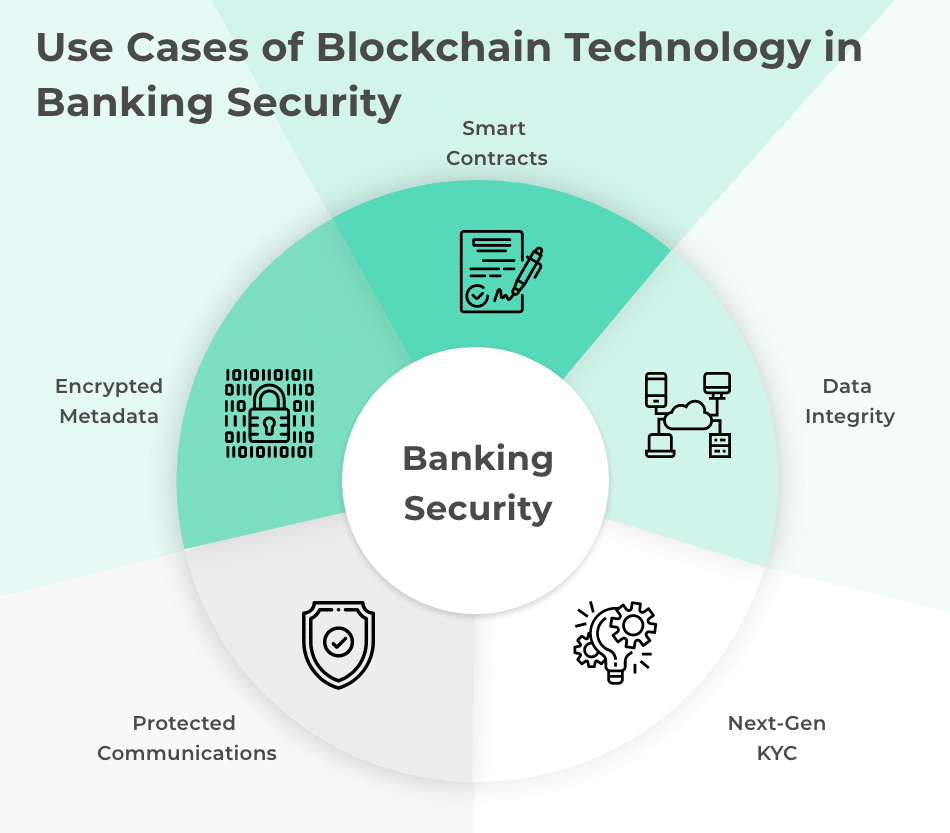
1. Blockchain Accelerates International Transfers
Issues make up the capital markets, and investors are matched according to their risk and return profiles. The blockchain development company is not subject to strict monitoring and regulation practices, has high liquidity risks and interest rate volatility.
Blockchain technology has the potential to revolutionize the financial markets by removing operational risks that might result in fraud and human error, as well as by lowering counter party risk.
Digitization and tokenization of assets and financial products make it easier to trade. They also promote global inclusivity and connectivity.
2. Blockchains Create an Audit Trail
Blockchain technology can increase the security of bank transactions by eliminating fraud, data duplication and maintaining an audit trail. Blockchain in finance industry networks are protected by thousands of ledgers; data can’t be altered unless the network is approved by all users.
Sensitive data is very tough to compromise for hackers and other bad actors, sparing the victims hundreds of thousands of dollars.
3. Blockchain Lowers Costs for Banks and Customers
Blockchain technology can automate bank processes. This means faster loan processing, payments and workflows. The costs of poor record-keeping, reconciliation and fraud are high.
Numerous parts of digital transactions may be automated via blockchain, boosting efficiency and lowering exposure to online dangers. Blockchain ledgers can help financial institutions address many of the issues associated with speed and cost.
By eliminating the traditional paperwork associated with banking, the blockchain in accounting services reduces overheads as well as additional costs. No third party or intermediary is required.
4. Blockchain Ensures Compliance
Blockchain enhances network governance through standardizing processes and automating conformance. Financial institutions must ensure they remain compliant with complex regulatory changes. When they operate outside of national boundaries, this is very crucial.
Compliance with regulatory requirements is also crucial for trading and eCommerce. Blockchain streamlines transaction verification and reporting, and simplifies financial transactions in real time. The immutable ledgers of blockchain and the asset digitization reduce fraud risk and allow for faster settlements.
5. Blockchain Secures Private Messaging
Hackers are increasingly targeting social media platforms such as Facebook and Twitter to target users. Every year, millions of accounts are breached due to the information being intercepted and falling into wrong hands.
Blockchain technology can be used by enterprises to enhance their security and standardize communication across different messaging channels. Using it will prevent data from being intercepted by encrypting communication between parties.
It can be implemented to prevent unauthorized parties from interfering with digital transactions, stop identity fraud, and protect digital interactions.
Cyber-physical infrastructure leverages blockchain in the banking sector for authentication and security, streamlining payments, and thwarting fraud. Upholding credibility, it also safeguards against internal threats, ensuring data integrity. You must hire a mobile app developer for effective implementation of banking app development.
6. Trading Finance
DeFi has already shown that people are becoming more interested in autonomous trades and markets. Even though those aren’t happening in banking right now, lenders might be tempted to start using them. As we’ve already talked about, blockchain technology in banks could totally change clearing and payment, which are important parts of any trade business.
7. Digital Identity Verification
Online financial deals can’t happen without proving who you are. But there are a lot of steps that need to be taken for this verification to work. For example, face-to-face checking, authentication and authorization. Tradle uses blockchain to store records of data checks and give full ownership and control of data to the person who owns it.
This means that the customer is in charge of sharing with banks, making the customer the service. This method from Tradle lets the owner share their data with any institution, across any country, and across company lines, all without breaking any data location laws or rules like GDPR.
8. Cross-Border Payments
Blockchain enables faster, more secure, and cost-effective cross-border transactions by eliminating intermediaries. It reduces processing time from days to minutes while enhancing transparency and traceability. Banks can use decentralized ledgers to track payments in real time, ensuring better efficiency and trust in international money transfers.
9. Insurance and Claim Processing
Blockchain streamlines insurance operations by automating claim verification and settlement through smart contracts. Once conditions are met, payouts are triggered instantly without manual intervention. This reduces fraud, speeds up processing, and increases transparency for policyholders and insurers alike. A tamper-proof record of policies and claims ensures trust and accuracy throughout the insurance lifecycle.
10. Loans and Credits
Blockchain facilitates faster, more transparent loan and credit processes by using smart contracts for automatic loan approvals, disbursements, and repayments. It eliminates intermediaries, reduces paperwork, and ensures more accurate credit scoring based on decentralized data. This leads to faster processing, lower fees, and increased access to credit, especially for underserved populations.
11. Fraud Prevention and Security
Blockchain enhances fraud prevention by providing an immutable and transparent ledger, making it nearly impossible to alter transaction records. This real-time, decentralized audit trail helps banks and financial institutions detect fraudulent activities quickly. With secure encryption and identity verification on the blockchain, the risk of identity theft, double-spending, and insider fraud is significantly reduced.
12. Mortgage and Property Management
Blockchain simplifies property transactions by providing a secure, transparent ledger for recording property ownership and mortgage details. This eliminates paperwork and reduces the risk of fraud or errors in titles and deeds. Smart contracts can automate mortgage payments, and blockchain ensures fast, efficient transfers, making real estate transactions quicker, safer, and more cost-effective for all parties involved.
Top 5 Examples of Banking Apps
Banking Apps |
Available Platform |
Downloads |
Ratings |
| Chime | Android | iOS | 10M+ | 4.8 |
| Ally | Android | iOS | 1M+ | 3.5 |
| Capital One | Android | iOS | 10M+ | 4.6 |
| Varo | Android | iOS | 1M+ | 4.7 |
| Chase | Android iOS | 10M+ | 4.4 |
1. Chime
The Chime app is a cutting-edge financial platform with seamless blockchain integration. It offers users secure and transparent transactions, real-time financial tracking, and decentralized management of digital assets.
With the help of a mobile app development company, you can easily create a Chime app with blockchain technology. Chime revolutionizes banking by providing a user-friendly interface that combines traditional banking services with the benefits of blockchain technology.
2. Ally
Ally is one of the best mobile banking apps offering online banking services. It provides a user-friendly platform for checking and savings accounts, as well as investment options. Ally stands out with competitive interest rates, no monthly fees, and 24/7 customer support. It’s a convenient choice for individuals seeking modern, accessible banking solutions.
3. Capital One
The Capital One app provides users with convenient and secure access to their financial accounts. It offers features like real-time transaction tracking, mobile check deposit, credit score monitoring, and personalized spending insights.
However, if you want to create an app like Capital One, then you must hire blockchain developers. The app prioritizes user-friendly navigation and robust security measures, enhancing the overall banking experience for Capital One customers.
4. Varo
The Varo app is a mobile banking application that offers a range of financial services. It allows users to open a bank account, manage their money, save, and even get access to early paycheck deposits. Varo aims to provide a convenient and accessible banking experience through its user-friendly app.
5. Chase
The Chase app offers a user-friendly mobile banking experience. Access your accounts, check balances, transfer funds, and deposit checks with ease. Enjoy features like QuickPay for effortless money transfers and real-time alerts for account activity. Secure and convenient, the Chase mobile application development simplifies managing your finances on the go.
How Will Blockchain Affect Banking in the Future?
Blockchain has not yet been widely adopted in the banking sector, but it is on its way. Financial institutions, including banks, need to consider many processes when adopting blockchain.
Banks should ensure they have the necessary infrastructure to support blockchain, and that all banks adhere to the global standards for this technology. This is the only way to ensure that blockchain can be implemented in all parts of the world.
Blockchain in banking industry will have many advantages when it becomes the global standard. This will result in more transparent banking, faster transaction processing, and lower processing costs. The future of blockchain technology in banking industry looks very promising.
Frequently Asked Questions
1.What Is Blockchain in Banking Industry And How Does It Work?
Blockchain technology is an unchangeable record that makes it easier to store, track, and keep an eye on assets and information over a network. Every transaction is saved as a block that is linked to blocks that came before and after it. The transactions are linked together in a way that makes a chain that can’t be broken.
2. How Much Does it Cost To Hire A Blockchain Developer?
The cost to hire a Blockchain developer can vary widely depending on factors such as location, experience, and project complexity. On average, you can expect to pay anywhere from $15 to $25 per hour for a blockchain developer’s services.
3. How Much Does Mobile Banking App Development Cost?
The Mobile Banking App Development Cost can vary widely depending on factors like complexity, features, platforms, and location of the development team. On average, it can range from $10,000 to $25000.
High-end apps with advanced security and features may cost even more. However, when you integrate blockchain technology, the blockchain app development cost will be higher.
4. How Much Time Does it Take To Develop a Banking App?
The development time for a banking app can vary significantly depending on complexity and features. A basic app may take 3-6 months, while a more advanced one could take 9-12 months or longer.
Factors like security, compliance, and platform choice also impact development timelines. To know the exact time estimation, you must consult with a mobile app development services provider.
